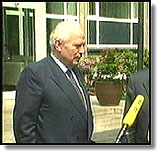
|
Doubts over Euro as German Government Backs DownThe future of the European Single Currency continues to look rocky after the German government climbed down in its row with the Bundesbank over revaluing the country's gold reserves.The row surfaced a few days ago when Finance Minister Theo Waigel proposed increasing the value of the reserves as a way of reducing the budget deficit, which is running too high to allow the country to enter the Single Currency. Bundesbank president Hans Tietmeyer rejected the plan, accusing him of financial trickery and of undermining the future stability of the Euro.
Even if there is an agreement, it does not look as though it will satisfy the government's needs. The deal on the table is understood to involve the transfer of funds taking place in 1998 rather than this year. This still leaves Bonn with a huge problem as it needs the funds now to reduce the 1997 deficit to 3.0% or less of gross domestic product in order to meet the Maastricht criteria. Mr Waigel told deputies from the governing Christian Democrats that Germany would still make the 1997 deadline. He said that he would now have to cut spending and speed up his privatisation programme.
With France electing a Socialist government at least partly because of opposition to the single currency, there are serious doubts over whether the Euro will go ahead on time in 1999.
(Also heard is Nomura International's Bronwyn Curtis.) See also: Major calls for Euro delay |
Diana, Princess of Wales, 1961-1997
Conference 97
Devolution
The Archive
News |
Issues |
Background |
Parties |
Analysis |
TV/Radio/Web
Interactive |
Forum |
Live |
About This Site
News |
Issues |
Background |
Parties |
Analysis |
TV/Radio/Web
Interactive |
Forum |
Live |
About This Site
© BBC 1997 |
politics97@bbc.co.uk |


